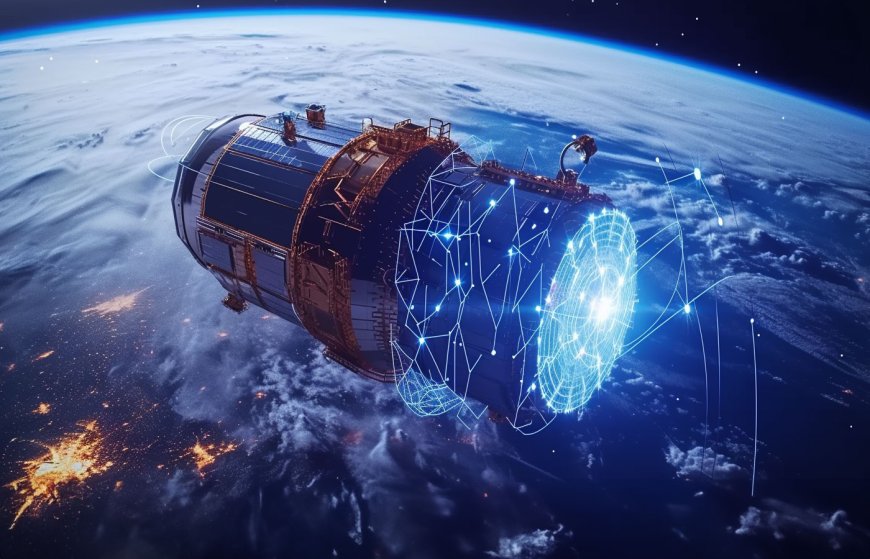The Role of Artificial Intelligence in Space Exploration
Discover how AI is transforming space exploration with real-time data analysis, autonomous navigation, and more. Learn about its benefits, challenges, and future prospects.

Introduction
Space exploration has always been a fascinating and challenging endeavor. From the first satellite launch to the moon landings and beyond, humanity has pushed the boundaries of what's possible. However, exploring the vast expanse of space comes with significant challenges, including harsh environments, limited resources, and the need for precise, real-time decision-making. This is where artificial intelligence (AI) comes in. AI is transforming space exploration by providing innovative solutions to these challenges. In this article, we'll explore how AI is advancing space exploration and discuss its applications, benefits, challenges, and future prospects.
1. What is Artificial Intelligence in Space Exploration?
a. Definition and Key Features of AI
Artificial Intelligence refers to the simulation of human intelligence in machines. These machines are programmed to think and learn like humans. Key features of AI include learning (acquiring information and rules for using the information), reasoning (using the rules to reach approximate or definite conclusions), and self-correction.
b. How AI is Applied in Space Exploration
In space exploration, AI is used to automate tasks, analyze data, and make decisions in real-time. It helps in navigating spacecraft, managing satellites, and even in astronomical research. AI technologies like machine learning, neural networks, and computer vision are increasingly being used by space agencies.
c. Examples of AI Technologies Used by Space Agencies
NASA, for instance, uses AI for various tasks such as autonomous navigation, data analysis, and predictive maintenance. The European Space Agency (ESA) employs AI for satellite operations and Earth observation. These examples show how AI is becoming integral to modern space missions.
2. The Importance of AI in Space Missions
a. Enhancing Mission Efficiency
AI can automate repetitive and complex tasks, reducing the need for human intervention. This not only saves time but also minimizes the risk of human error. For example, AI can handle routine maintenance checks on spacecraft, freeing up astronauts to focus on more critical tasks.
b. Real-Time Data Analysis
Space missions collect vast amounts of data, which need to be processed quickly for timely decision-making. AI systems can analyze large volumes of data in real-time. For instance, AI can process images and signals from space probes, helping scientists understand distant planets and stars more effectively.
c. Overcoming Human Limitations
AI can operate in extreme conditions where humans cannot. This is crucial for long-duration missions where human presence is not feasible. AI systems can withstand the harsh environments of space, making them invaluable for such missions.
3. Applications of AI in Space Exploration
a. Autonomous Spacecraft Navigation
AI plays a crucial role in controlling spacecraft without human input. For example, NASA’s Autonomous Systems and CubeSat missions use AI to navigate and make decisions independently. This autonomy is essential for deep space missions where communication delays make real-time human control impractical.
b. Rover Exploration on Planets
AI is instrumental in navigating the challenging terrains of other planets. The Perseverance Rover and Curiosity Rover on Mars use AI to navigate autonomously, avoiding obstacles and collecting data. These rovers can make decisions based on their environment, ensuring mission success.
c. Satellite Management and Operations
AI optimizes satellite orbits and operations, ensuring they function efficiently. Applications include Earth observation and communication satellites, where AI helps in data collection and transmission. This improves the reliability and effectiveness of satellite services.
d. Predictive Maintenance for Space Equipment
AI systems monitor and predict equipment failures, ensuring the longevity and safety of space missions. For example, maintenance systems on the International Space Station (ISS) use AI to detect and address potential issues before they become critical.
4. AI in Astronomical Research
a. Identifying Exoplanets
AI's ability to analyze light curves and detect exoplanets is revolutionary. Tools like NASA’s Kepler mission use AI to sift through vast amounts of data, identifying potential exoplanets that could support life. This accelerates the search for habitable worlds beyond our solar system.
b. Processing Astronomical Data
Handling vast datasets from telescopes is a daunting task, but AI makes it manageable. For instance, AI played a crucial role in capturing the first images of black holes, processing the enormous data collected by the Event Horizon Telescope.
c. Simulating Space Environments
AI is used to model and simulate cosmic phenomena, providing insights into the universe's workings. This benefits both theoretical and applied research, helping scientists understand complex space environments better.
5. Benefits of AI in Space Exploration
a. Increased Accuracy and Precision
AI reduces errors in data analysis and decision-making, enhancing mission success rates. By providing accurate and precise information, AI ensures that space missions achieve their objectives efficiently.
b. Cost and Time Savings
AI minimizes mission costs by automating tasks and reducing the need for human intervention. It also accelerates research and exploration timelines, making space missions more cost-effective and time-efficient.
c. Advancing Human Knowledge
AI facilitates discoveries that expand our understanding of the universe. By answering fundamental scientific questions, AI contributes to our knowledge of the cosmos, pushing the boundaries of what we know about space.
6. Challenges of Using AI in Space Exploration
a. Technical Limitations
Developing AI systems for extreme space environments is challenging. These systems need to be robust and adaptive, capable of functioning in harsh conditions. Ensuring the reliability of AI in space is a significant technical hurdle.
b. Ethical and Operational Concerns
Balancing human control with AI autonomy is crucial. Ensuring transparency and accountability in AI decisions is essential for the ethical operation of space missions. This requires careful consideration and regulation.
c. Resource Constraints
The high costs of AI research and implementation are a challenge. Additionally, limitations in computational power and energy in space need to be addressed to make AI systems more effective and sustainable.
7. The Future of AI in Space Exploration
a. AI and Human Collaboration
Enhancing astronaut capabilities with AI assistance is a promising area. AI can support astronauts in hybrid missions, combining human intuition with machine precision. This collaboration can lead to more successful and efficient space missions.
b. AI in Deep Space Missions
AI will play a crucial role in exploring distant planets and galaxies. Preparing for interstellar travel, AI systems will be essential for navigating and making decisions in deep space, where human control is not feasible.
c. Integration with Emerging Technologies
Combining AI with robotics, quantum computing, and biotechnology can revolutionize space exploration. Future projects and concepts will integrate these technologies, creating more advanced and capable space missions.
8. Tips for Advancing AI in Space Exploration
a. Increasing Investment in AI Research for Space
Investing in AI research is crucial for advancing space exploration. This includes funding for developing new AI technologies and improving existing ones.
b. Building Interdisciplinary Teams and Collaborations
Building teams that combine expertise from different fields can drive innovation in AI for space exploration. Collaborations between scientists, engineers, and AI experts can lead to groundbreaking advancements.
c. Fostering International Cooperation in AI-Driven Missions
International cooperation is essential for the success of AI-driven space missions. Sharing resources, knowledge, and technology can accelerate progress and ensure the benefits of AI in space exploration are shared globally.
Conclusion
AI is transforming space exploration, providing innovative solutions to its challenges. From automating tasks to analyzing data and making decisions, AI is integral to modern space missions. While there are challenges to overcome, the future of AI in space exploration is promising. By supporting AI advancements, we can unlock the mysteries of the cosmos and push the boundaries of human knowledge.
Frequently Asked Questions (FAQs)
1. How does AI help in space exploration?
AI helps in space exploration by automating tasks, analyzing data, and making decisions in real-time. It enhances mission efficiency, overcomes human limitations, and facilitates discoveries that expand our understanding of the universe.
2. What are some examples of AI in space missions?
Examples of AI in space missions include autonomous spacecraft navigation, rover exploration on planets, satellite management, and predictive maintenance for space equipment. AI is also used in astronomical research for identifying exoplanets and processing astronomical data.
3. What challenges do AI systems face in space?
AI systems face technical limitations, ethical and operational concerns, and resource constraints in space. Developing robust and adaptive AI systems, ensuring transparency and accountability, and addressing high costs and computational limitations are some of the challenges.
4. How does AI contribute to the search for extraterrestrial life?
AI contributes to the search for extraterrestrial life by analyzing data from space missions and identifying potential exoplanets that could support life. Tools like NASA’s Kepler mission use AI to sift through vast amounts of data, accelerating the search for habitable worlds.
5. What is the future of AI in interstellar exploration?
The future of AI in interstellar exploration involves AI and human collaboration, AI in deep space missions, and integration with emerging technologies. AI will play a crucial role in navigating and making decisions in deep space, preparing for interstellar travel, and revolutionizing space exploration.
What's Your Reaction?








































